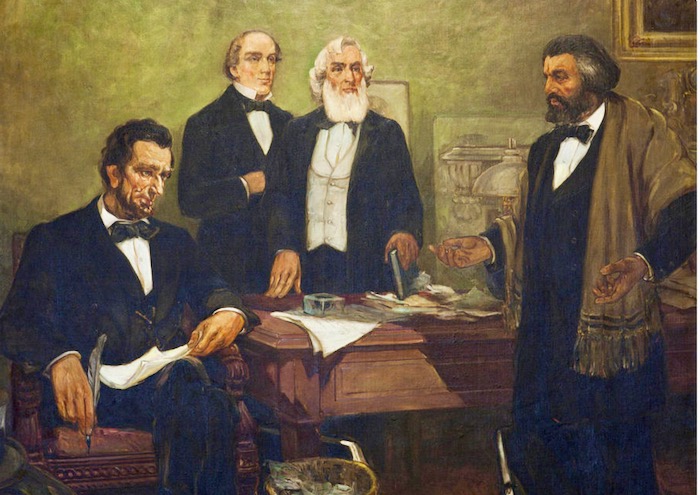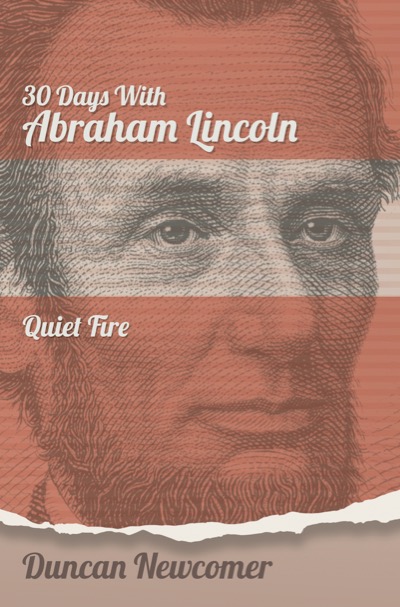
TWO HISTORICAL MILESTONES IN A SINGLE IMAGE: Frederick Douglass met Lincoln face to face three times. This famous painting depicts his first appeal to Lincoln in 1862 to combat discrimination in the Union army against black soldiers. The main effort to recruit black regiments began only after the Emancipation Proclamation took effect in January 1863. No photographs were taken during that meeting. This 1943 painting of the encounter is a milestone for two reasons. First, it broke new ground because it was an official U.S. government commission painted for public display by an African-American artist, William Edouard Scott. Second, it depicted Douglass in a clearly dominant position as he argued the case of black troops with a seated and weary Lincoln.
.
.
By DUNCAN NEWCOMER
Host of the ‘Quiet Fire’ series
This is Quiet Fire, a meditation on the spiritual life of Abraham Lincoln and its relevance to us today. Welcome. Here’s a Lincoln quote for you:
“In regard to the great book, I have only to say it is the best gift which God has ever given man. All the good from the Savior of the world is communicated to us through this book. But for it we could not know right from wrong.” Lincoln is replying to the gift of a Bible from a group of black visitors to the White House, some former slaves, some ministers. This quote is part of his reply early in September, 1864.
Lincoln’s life is inseparable from the Bible. If you subtract the Bible from Lincoln’s life you don’t have Lincoln. Lincoln, of course, is also inseparable from the life of black people in America. Without the black presence in America there would be no history of Abraham Lincoln.
It is then revealing to recount some of the stories of when all three meet: Lincoln, black people and the Bible.
In this 1864 event, Lincoln sees the Bible as a gift from God. Much of his own religious struggle was with Enlightenment Reason versus Biblical Revelation. But he comes to think—as he once told his best friend Joshua Speed—that you should go as far as you can with reason and then go the rest with revelation. The Bible is the gift of God’s word and the best one. It is a revelation not a conclusion.
In the grand narrative of American culture there is no other book, then or now, with this transcendent status. Lincoln does not, however, see the Bible as an American book. It is “the great book” with a message for the world. Lincoln’s eyes were on the whole world. In Lincoln’s view, “the work we are in” is to “achieve, and cherish a just and lasting peace, among ourselves, and with all nations.” Those were his last Inaugural words.
For Lincoln the Bible is not the white man’s book.
When Lincoln, black people and the Bible converge in his life, it is revealing to see Lincoln’s point of view, and a point of view of the Bible, but also to see what might be learned from the black person’s point of view.
What might this 1864 “deputation of colored folk” as one old historian puts it, be seeing and thinking here with their Bible gift? This is in the aftermath of the Emancipation Proclamation. This delegation is bringing sincere thanks. It is also near the time of the all-important next Presidential election. They and he might have some reasons to meet and share their loyalty to each other. What, then, might be the most meaningful and appropriate gift that they could put into his hands, to have him hold up in front of them?
The Bible is as much the spiritual property of black people as it was for this white man Lincoln. It could be a gift, then, between equals in terms of their biblical standing. The Bible could be a proudly given free gift from the former slaves to the present President.
There are other significant moments when Lincoln, the Bible and black people interact. One is when, as a young man, he receives the gift of a Bible from his best friend’s Mother, Mrs. Speed. The Speeds were slave owners. He would have been assigned a slave to care for him on his visit, no doubt. Lincoln is visiting Joshua Speed, his first roommate from Springfield and longest friend. He is in the deepest of “blues.” This motherly woman gives him a Bible and offers its support. He responds that if he could but take it on faith he knew it would help him. Lincoln promises to read it but he notes his own skepticism.
That Bible would have been in his bags as he took a steam boat back from Kentucky to Illinois. It is on that boat that he has the indelible sight of slaves, strung, he later writes, “like trout on a line,” but singing and sharing joy and music while in their chains.
Lincoln, a Bible, and black slaves.
Years later a former slave, a woman, his wife’s dressmaker, sees Lincoln one evening in the White House reading the Bible. Elizabeth Keckley had bought her freedom from her St. Louis master for twelve hundred dollars.
We see an echo of this moment in Stephen Spielberg’s movie “Lincoln” when the two meet on the steps of the White House. They have a profound moment of wondering about the future of America and the races. They see each other honestly in terms of race. The script by Tony Kushner has Lincoln admitting his own ignorance, his lack of real experience in seeing black people as equals. “I don’t know you Mrs. Keckley.” It is a stunning and real moment of honesty from the Great Emancipator.
In her biography Elizabeth Keckley writes, as if a continuation of this scene, that she had seen the President walking back from the War Office. “His step was slow and heavy and his face sad. Like a tired child, he threw himself upon the sofa, and shaded his eyes with his hand. He was a complete picture of dejection.” He reported the news from the War Office was “dark, dark everywhere.” He then, she reports, took a small Bible from a stand near the sofa and began to read.
Fifteen minutes pass, as this is reported by Stephen J. Vicchio in his book Abraham Lincoln’s Religion, she writes, “I glanced at the sofa and the face of the President seemed more cheerful. The dejected look was gone; in fact, the countenance was lighted up with new resolution and hope.”
Lizzy Keckley, as she was known, then reports walking behind the sofa to see just what it was Lincoln was reading. It was the Book of Job. She says she could almost hear, “the Lord speaking to him from out of the whirlwind of battle saying ’Gird up thy loins like a man; I will demand of thee, and declare thou unto me.’”
She adds, “Ponder it, oh you scoffers of God’s Holy Word, and then hang your heads for very shame.”
The Bible was a bond between Lincoln and black people. When Sojourner Truth, featured in a recent movie, “Harriet,” wrote to Lincoln that she feared he was in danger like Daniel in the Lion’s Den, he wrote back a letter full of references to the Book of Revelations.
On October 29, 1864, when the intrepid and intuitive Sojourner Truth visited Lincoln at the White House he showed her that Bible the ministers from Baltimore had given him. Their gift was dated “Baltimore, 4th of July, 1864.”
He shared with her that he often did feel like Daniel in the Lion’s Den. She is reported to have said, “…if the lions did not tear you to pieces, I knew it would be God that has saved you; and I said if he spared me I would see you before the four years expired, and he has done so, and now I am here to see you for myself.”
In the Great Chain of Being that we can call the spiritual life of Lincoln there are many links—none stronger than that between himself, the Bible and black people.
That link can hold us in honor down to the latest generation.
.
.
Care to Enjoy More Lincoln Right Now?
GET A COPY of Duncan’s 30 Days with Abraham Lincoln—Quiet Fire.
Each of the 30 stories in this book includes a link to listen to the original radio broadcasts. The book is available from Amazon in hardcover, paperback and Kindle versions. ALSO, you can order hardcover and paperback from Barnes & Noble. In addition, our own publishing house offers these bookstore links to order hardcovers as well as paperbacks directly from our supplier.
.
- Duncan Newcomer’s Abraham Lincoln Quiet Fire 4: The courage to say—’In spite of all this, I will be!’
- Duncan Newcomer’s Abraham Lincoln Quiet Fire 1: In this cruel month of death, what will be our legacy?
- Duncan Newcomer’s Abraham Lincoln Quiet Fire 2: Coping with the Uncertainty and Mystery of a Deadly Disease
- Duncan Newcomer’s Abraham Lincoln Quiet Fire 3: We Must Rise with the Occasion
- Duncan Newcomer’s Abraham Lincoln: When will we be good? God knows!
- Duncan Newcomer’s Abraham Lincoln Quiet Fire 6: Lincoln’s Courage to Judge and to Lament
- Duncan Newcomer’s Abraham Lincoln Quiet Fire 7: Lincoln looks toward his spiritual hero, Washington
- Duncan Newcomer’s Abraham Lincoln Quiet Fire 8: Four Score and Seven
- Duncan Newcomer’s Abraham Lincoln Quiet Fire 9: A Unique Spiritual Quest and The Pilgrim’s Progress
- Duncan Newcomer’s Abraham Lincoln Quiet Fire 10—When all three meet: Lincoln, black people and the Bible.
- Duncan Newcomer’s Abraham Lincoln Quiet Fire 11—Raising a Flag and Contemplating the Sacred Pillars of America
- Duncan Newcomer’s Abraham Lincoln Quiet Fire 12—Why do we refer to our most eloquent president as ‘Quiet’?
- Duncan Newcomer’s Abraham Lincoln Quiet Fire 13—Ultimately, we are responsible for our faces.
- In Our Struggle for Freedom, the Truth is Not in Our Statues—It’s in Our Souls
- Duncan Newcomer’s Abraham Lincoln Quiet Fire 16—In racial justice, ‘We … bear the responsibility.’
- Duncan Newcomer’s Abraham Lincoln Quiet Fire 17—Remembering Mrs. Keckley, a close friend who Lincoln realized he did not truly know
- Duncan Newcomer’s Abraham Lincoln: Remember when a president’s 1st value was Kindness?
- Abraham Lincoln Quiet Fire 19—’The election was a necessity’
- Duncan Newcomer’s Abraham Lincoln Quiet Fire 20—’A Most Sacred Right’
- Duncan Newcomer’s Abraham Lincoln Quiet Fire 21—Locating the spiritual X-factor in Lincoln’s ground-breaking life
- Duncan Newcomer’s Abraham Lincoln Quiet Fire 22—Lincoln shows us the power of holding even opposites together
- Duncan Newcomer’s Abraham Lincoln Quiet Fire 23—The forest vision Lincoln shared with poet Rabindranath Tagore
- Duncan Newcomer’s Abraham Lincoln Quiet Fire 24—Myths and wisdom in national conversation about rule of law
- Duncan Newcomer’s Abraham Lincoln Quiet Fire 25—How a true leader expresses the nation’s grief
- Duncan Newcomer’s Abraham Lincoln Quiet Fire 26—Choosing Humility over Humiliation
- Duncan Newcomer’s Abraham Lincoln Quiet Fire 27—What shaped Lincoln’s soul?
- Duncan Newcomer’s Abraham Lincoln Quiet Fire—Here’s to you Mrs. Robinson!
- Duncan Newcomer’s Abraham Lincoln Quiet Fire—Now, we’re all hoping for ‘Yonder’
- Duncan Newcomer’s Abraham Lincoln Quiet Fire—In three words, he said it: ‘We are elected.’
- Duncan Newcomer’s Abraham Lincoln Quiet Fire—Let’s remember how he reached across the aisle to discover new friends
- Duncan Newcomer’s Abraham Lincoln Quiet Fire—Marking the anniversary of those 272 words at Gettysburg
- Duncan Newcomer’s Abraham Lincoln Quiet Fire—’The Last Best Hope of Earth’
- Duncan Newcomer’s Abraham Lincoln Quiet Fire—’A Christmas Carol’ with Abraham Lincoln

